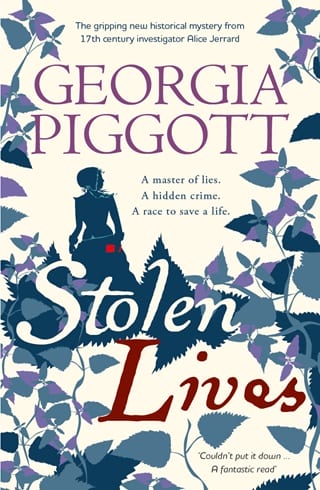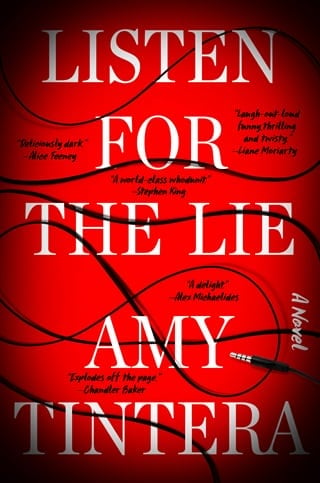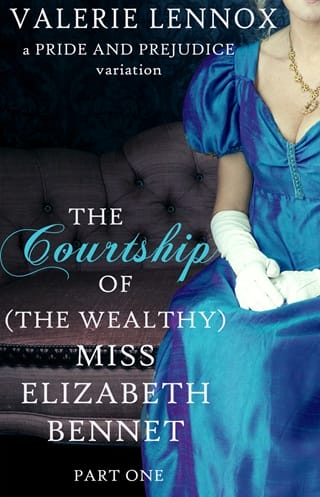14
W hat do you think, Ursula?’ Riding to the dyeworks, Alice has told Ursula of Luella’s revelations last night.
‘I hardly know what to think. It would be monstrous if it were true, and it’s monstrous if she is lying.’
‘That can be established if Wat is allowed to speak for himself,’ Alice suggests. ‘Why don’t you ask him?’
‘I wouldn’t dream of doing any such thing!’ Ursula glances round at the carts behind them with their loads for repairs to the dyeworkers’ cottages. They follow close, but not that close.
‘Why ever not, Ursula?’
‘If he has something to confess, he can say.’
‘Ursula, he does not know that Mistress Goldwoode has made this accusation.’
‘He is here. He knew Master Goldwoode was coming to see me. He has seen Mistress Goldwoode. Therefore, if he has anything to confess he knows now is the time.’
‘If he does not know to say anything to you, will that not leave you with a nagging uncertainty?’
Silence.
‘King Solomon heard both sides before making his judgment,’ Alice reminds her.
‘Oh, Alice,’ Ursula says at last and sighs. ‘I do so hate the direct question; it is unduly intrusive.’
‘Perhaps you’re assuming he is the thief Luella suggests.’
‘He might make up a story, for fear of losing his position.’
‘At least you will have given him a chance,’ Alice urges. ‘The manner of his answer will allow you to judge for yourself if you believe him or Luella.’
‘Perhaps Luella has made up this story to assuage her own foolishness,’ Ursula wonders.
‘She didn’t need to say anything, in that case.’
‘There are women who do these things, Alice. Allow their heart free rein towards a man, and become vengeful when they are disappointed.’
‘It’s a very serious lie to tell against an innocent man, if that’s what she has done.’
‘ When he did not come at her bidding, her love turned to hate. The fact Wat is here simply confirms that he was exonerated. As an honourable man, he would not speak disparagingly of Luella, so he would have nothing to tell me on either count if I asked him. It only goes to confirm I should not encroach.’
‘But the hanging that Luella’s father witnessed?’
‘There was no hanging. He had swiftly dismissed Wat when he discovered his daughter’s distress, and told her a credible lie that closed the subject.’
Alice is silent. A nagging sense that Ursula could be right battles with the misgiving that her friend is easily persuaded to side-step a looming awkwardness. It avoids the disagreeable, and satisfies her honour that she has not intruded upon Wat’s privacy. Then again, Alice reminds herself, recalling Olivia’s counsel, I should not interfere, it will only cause offence.
‘Since Luella on behalf of her daughter will inherit everything besides the business,’ Ursula continues, ‘she will likely have no shortage of offers for her hand. And the sooner she is off my hands the better satisfied I shall be.’
‘From what she said, she will raise Martyn and Helena out of their difficulties, if not to riches, at least to comfortable thrift.’
‘Yes, I believe she will keep her word in that respect. And make certain that Helena can marry.’
‘Mercy me,’ Alice comments. ‘With no Helena to harangue, I pity any future servant of Martyn’s.’
They ride on in silence for a while, the carts behind rumbling and clacking under their weight of wood, tile and lime wash. The men leading the horses encourage with occasional calls to the massive, shaggy-footed beasts pulling their loads with broad-beamed ease.
‘Sir Thomas has sent word,’ Ursula says. ‘We take supper this evening.’
Alice walks with Wat towards the coach-sized doors of a substantial barn-like building. This, he tells her, is the madder house where cloth is dyed red from the roots of the madder plant. Smoke rises twisting and spreading thickly from the vents at each end of the roof, and more steals thief-like from under the tiles. He pushes at the wicket gate set in the great door, and as they pass through, the heat whips away her breath and beats her eyes closed. It is a few seconds before she can open them, several more before she can discern anything. Coming in from the bright sunlight has made the dark momentarily impenetrable.
Two open-fronted ovens of orange fire emerge at the far end, figures like black shadows passing to and fro. All is commotion and heat and shouting, and overlying all is the roar of the two colossal infernos. Her sight gradually adjusting, it becomes clear that each furnace is contained within a large box-like stone structure shaped like a huge bread oven, half the height of a house. Open at the front, each breathes streams of flame within its maw. Smoke escaping from the hole curls upwards to hover in a dense moil under the high, pitched roof, obscuring the smoke vents she saw from the outside.
Her eyes are drawn back to the furnaces where a boy, clad only in a loincloth, runs constantly back and forth, feeding the blaze from a great heap of wood. Wat rolls his sleeves up and Alice does likewise, and wishes she could dispense with her tight-laced bodice too.
Above the fires, sunk into the top of each furnace box, a cauldron, higher than a standing man and at least six paces wide, churns great clouds of steam. Alongside each cauldron is a wooden platform, and a man stands on one of them, shining with sweat and clad like the boy in naught but a loincloth. He carries a large long-handled paddle with which he stirs the hot dye liquor. Above him, at the top of a further set of steps, stand two men, one each side of the cauldron’s lip. Blurred by the swirling vapour, shirtless and shoeless, they vigorously work the handles of a winch turning a great wooden cylinder fixed above head height. Round the cylinder runs a length of cloth moving up out of the cauldron, deep red and streaming, rolling over the cylinder and back down into the dye.
‘That’s a full bolt of wool,’ Wat shouts above the din. ‘They feed it in and out of the vat four or five times to take the dye.’
‘Why don’t they simply put in the whole roll and paddle it around?’ she asks. She has raised her voice to beat the cacophony, and makes paddling gestures.
‘You do that with woad,’ he cries, leaning close, ‘but madder doesn’t work like that, it would give an uneven dye.’
‘So it’s joined into a continuous roll?’ Alice asks, describing a circle with her arm.
He says something at the same moment as one of the fires collapses in on itself, and the men roar at the boy as he runs to feed it.
A bare-chested man in light linen breeches draws near, pushing a swaying cart piled higher than himself with logs. The load teeters, and Wat springs to lend support and steady the cart until the man has control again.
‘Thank ye, Master Wat,’ the man shouts.
‘Do you need to pile it quite so high, man?’
‘I wouldn’t usually but Slank said I should, sir.’
‘Don’t listen to him,’ Wat cries, taking off logs as he speaks. ‘Pile it as you usually do; otherwise there’ll be an accident. Collect these as you come back.’ The man with a nod of thanks takes more logs off and moves on his way. Wat turns back to Alice. ‘We have to keep the heat even,’ he yells above the clamour, ‘but if he sheds his load, the boy doesn’t get the logs and we could lose that entire batch up there.’
‘How much in that length of cloth?’ she shouts, indicating the fabric rolling through the cauldron.
‘About forty-five ells. The women sew the ends together to make the roll before it goes into the bath. Come this way,’ he says shepherding her away from the furnaces to the other side where the din is slightly less. ‘When it’s taken the dye,’ Wat explains, ‘it’s hung like those over there.’ He points at a line of rich red lengths suspended over wooden poles fixed high in the wall, dripping into long sinks.
Two men pass them, bearing between them a tied bundle bulging round the cords that criss-cross it. One of them stumbles against Wat, whose arm shoots out. ‘Steady, there.’
The man staggers back, a frightened look on his face. ‘Don’t hit me, sir! Please!’
‘I wasn’t going to, Slank,’ Wat says. ‘What’s to do with you?’
‘Thank ye sir, thank ye, most obliged, sir,’ the man says.
‘What were you thinking by telling that man to pile his logs high?’ Wat asks.
‘Me, sir? No, sir, I never said that, sir,’ Slank declares.
Wat’s mouth tightens but he says nothing. Behind his back Alice sees the man’s companion grin as they continue on their way.
‘What was that they were carrying?’ she asks.
‘Madder root,’ he tells her. ‘It’s shipped like that in bales. Master Goldwoode brought several bales with him. The last lot was all mull madder and my mistress complained. It’s made us behind with our obligations. That’s why they’re so exercised about keeping the furnaces going. At present we can’t afford to have bolts rejected.’
‘And mull madder? What’s that?’
‘Poor quality root, not fit to use. It doesn’t dye evenly and won’t fix properly. When they discovered the bale was mull they put it to one side and opened the next. They went through the entire consignment and it was all bad. The dye master thinks it was an old batch, probably stored too long, and they thought they’d palm it off on us, but they wouldn’t usually try it on with a large dye works like this. That was when my mistress summoned Master Goldwoode.’
Through the ordered commotion of men moving cloth, laying cloth on benches, folding cloth, pairing up to carry water in great wooden tubs suspended on poles, shifting bales, fetching logs, they make their way out of the madder house. In the fresh air, the clamour within is muted once more. The people who work there, day in, day out, she thinks, earn every groat they are paid. ‘Are all the dye houses like that?’
‘It’s quieter in the woad house.’ Wat points. ‘The vats don’t sit over furnaces. You can see the finished cloth hanging up round the corner there.’
She is surprised at the variety of blues. They are all dyed to a particular shade, Wat explains, there are sample cards that the master dyer uses to ensure the colour is correct. ‘We put the cheaper cloth in after the better cloth has taken its due dye,’ Wat says. ‘That watchet there was third or fourth into the bath. The dark one, the indigo, went in first. That’s a very fine French cloth.’
‘Sir Thomas was wearing cloth like that when I saw him yesterday.’
Wat nods. ‘He had a length from my mistress as thanks for some kindness. Something to do with the new Poor House they’re building in Woodley, I think.’
Alice recalls a conversation back in early spring, Ursula’s eyes alight with enthusiasm for this new project. ‘She is eager to have a voice in its design and the manner of its supervision.’
Wat nods. ‘Something very dear to her heart, I believe.’
‘So what other colours do you produce here?’
‘Black, more of that than any other, those two buildings over there are the black houses. We use copperas and oak galls. A little yellow, from weld; not much demand for it, though. We do green. Nettles make a good green.’
‘I’ve tried dyeing small items with nettles, but the end colour always looks sludgy,’ Alice laughs, ‘and it’s so easy to get stung.’
Wat smiles, a rarity, and for that brief moment, his whole face changes. ‘You have to get them at the right time of year,’ he explains. ‘Now that it’s flowering, in fact. When you can strip the stems and make cord, that’s the time when the leaves make the best green.’
‘You have fields of nettles?’ she asks.
‘Not so. Nettles like to grow at the edges of woodland.’ He points. ‘All that copse over there, for instance, is surrounded by a thick belt of nettles. The men may not scythe anywhere near. We grow it like a crop for this purpose.’
‘What sort of green? Not my sludgy green, I don’t suppose?’
‘It’s a particular soft yellow-green, not the blue-green you see in coat linings and suchlike,’ Wat explains. ‘Come this way, I’ll show you something else we do with nettles.’ He shepherds her towards a small building like a labourer’s hut. The door stands open to the sun and within several women sit at work on benches, sleeves pulled down, gloved. Sheaves of stinging nettles lie in their laps, and stripping the leaves off the stems, they drop them into wicker baskets and lay the stems on a table. There, several children pick away the outer sheath of the stem to get at the pithy centre.
‘The children are not gloved!’ Alice exclaims. ‘Why are they not given gloves?’
‘Doesn’t sting, once it’s been stripped,’ Wat says. ‘See how the women run the glove up and down the stem after they’ve taken off the leaves? That’s to make sure there’s no more sting. Look.’ He picks up a bunch of stripped stems from the table and holds them in his fist.
The children giggle at her as she gingerly takes one between thumb and finger. ‘Oh! You’re right, there’s no sting. I know when you cook nettles it stops them stinging, but I did not realise you could clear the sting without cooking.’
‘They strip off the outer sheath and split the inner pith until they have several lengths to twist together,’ Wat explains, peeling one to show her. ‘They splice length into length and it makes a good strong cord. We use it to bind the finished bolts of cloth in their wrappings.’
‘You know a great deal about this business, Wat,’ she says, ‘even though you have been here little over a year.’
‘When my master was alive,’ he says, looking away, ‘it was best to be a fast learner.’ He leaves it at that.
They are leaving the nettle house as a man approaches bearing a fresh sheaf of nettles. As he passes them, Wat jumps back. ‘Aahhh!’ His sleeves rolled up as they are, Wat’s bare forearm has taken a brush of nettles. The man has passed on into the nettle house without a backward look.
Within seconds a rash appears and Wat is clearly in discomfort, squeezing his arm with his hand to counter the sting. ‘I need a dock leaf,’ he says, looking around. ‘I think that’s supposed to help.’
The nettle porter emerges having delivered his bundle. He looks at Wat’s arm. ‘Should’ve got out the way. Not my fault,’ he says, and then staggers sideways as he is caught a great clout across the shoulders with a stout stick.
‘I saw you, you rogue!’ Stick in hand, a one-armed man rolls on crooked legs and places himself before the porter. ‘Did it on purpose.’
‘I never!’
‘Get back to your work, Messer, and be glad I don’t report you to the dye master! Go on, off with you!’ As the man slinks away, ‘Don’t take no notice of that fool, Master Wat,’ the crooked man says. ‘I saw those two with the bale in the madder house as well. Slank and his friend Guttery. They’re restive, it’s always like this in the hot weather.’
‘How are you, Robin,’ Wat asks, wincing and squeezing the swelling on his arm. ‘I didn’t see you when I came up a couple of days ago.’
‘Can’t complain, I get by, you know. You should spit on that,’ Robin says, pointing at Wat’s arm. ‘Helps soothe it.’
‘Not dock leaf?’
Robin jerks his head in the direction of the nettle house, adding. ‘Spit’s what they all use in there; they don’t bother with dock leaves.’
‘Arrowheads is what they need,’ says a voice and Alice turns to see an elderly, stooping man, clutching a piece of rock to his chest. His straw-coloured hair stands wispy around his head like a halo, and in his eyes is a look both intense and blank. ‘That’s what we say, let your arrows spit on the Spanishes.’
‘What are you doing here, father?’ Robin asks him.
‘Knapping arrowheads for my lady Queen. She’s commanded it.’
‘Arrowheads are iron, father, not flint,’ Robin tells him gently. ‘And the Spanish aren’t coming now.’
‘Don’t you believe it, boy. They’re coming, but we shall shower arrows on every invader.’ He addresses Wat. ‘They’ll never land on English soil.’
‘My grandfather used to say the same, sir,’ Wat replies, massaging his arm where the rash shows angrily swollen. ‘I grew up years after the Spanish fleet was destroyed, but my grandfather still said it.’
‘Father used to be a flint knapper, mistress,’ Robin explains to Alice. ‘When the invasion was daily expected in eighty-eight, he turned his hand to making musket gunflints for the town magazine in Dorchester. But one good flint can fire well over a hundred shots so there was no lasting work there, and the invasion never came in the end. After he moved here, he got this maggot in his head of flint tips for arrows.’
‘Twenty an hour I turn out,’ his father says. ‘Twenty heads for twenty heads. Heh, heh, heh!’ he cackles. ‘You should pay attention, boy, they’re coming, for sure.’
‘Things have changed, father. It’s not bows, it’s muskets now.’
‘Twenty an hour,’ the old man repeats, addressing Alice. ‘Rain or shine. Look.’ He puts down his piece of rock and searches about his person. ‘It’s here somewhere.’ Patting his chest, feeling around.
‘He believes Queen Bess is still alive and the Spanish fleet is coming,’ Robin explains quietly to her. ‘He’s been like this for several years now. He’s harmless, mistress, do not heed him.’
‘Here!’ His father holds up for her inspection a sliver of flint the length of her finger, finely knapped into a pointed leaf shape. Fascinated Alice accepts it from his outstretched fingers. She has seen plenty of iron-tipped arrows, mostly used for sport now, but never stone arrowheads. The symmetry of the shape, the fineness of the shave, are a revelation to her.
‘Such skilled work, sir,’ she says running a finger along it. ‘I can feel its keen edge.’
‘Twenty an hour,’ his father repeats, taking back the arrowhead. His eyes kindle. ‘You should see the barbed ones. If it don’t kill ’em going in, ’twill surely kill ’em coming out!’ He crooks his arm, making a twisting, pulling gesture. Alice winces. ‘Twenty an hour,’ he repeats and drops the arrowhead back between jerkin and shirt. Picking up the flint rock and cradling it once again to his chest, he wanders away, still muttering, ‘Twenty an hour.’
Robin slowly shakes his head. ‘His skill was knapping flint for buildings. When the mansion was to be built, nearly ten years ago, Master Cazanove put out a call for knappers and I got Father to come and offer his skills, but Master Cazanove delayed for months and then changed his mind, insisted on brick. Father felt tossed on the midden heap. It was about then he started to wander in his head. He still remembers knapping down to the last detail, but cannot recall what he did yesterday.’ He looks keenly at Wat. ‘Are you well, Master Wat?’
‘Yes, yes, quite well, thanks, Robin,’ Wat says. ‘Went a bit strange for a minute, that’s all. Not used to the heat in there. Mistress Jerrard, you’re all right, are you?’
‘I confess I felt slightly nauseous,’ she tells him, ‘but it was so interesting. I thank you for showing me how madder is dyed. Master Robin,’ she goes on, ‘did your father find work here after his disappointment over Master Cazanove’s house?’
‘The only work for him here is road mending, but it’s crude in comparison.’
‘Didn’t your father live in Dorchester before?’ Wat asks.
‘He did. That’s where I grew up. But he can’t go back, not the way he is now.’ He adds distractedly, ‘Jay’s very good with him.’
‘How is your brother?’ Wat asks.
Robin rouses himself. ‘Jay? Oh, he’s well, sir, thank you.’
‘And Mistress Harker and your daughter, how are they?’
‘They’re hale, sir. Mistress Cazanove has taken my daughter into the big house now, you know?’
‘I didn’t know.’
‘Just this week, she asked her to look after a lady’s baby there,’ Robin tells him. ‘Beg pardon, mistress,’ he turns to Alice, ‘perhaps it’s your baby.’
‘Not mine, Master Robin, that will be Mistress Goldwoode’s little daughter.’
‘My girl said the lady’s husband was the one strangled at the inn,’ Robin says. ‘I told her to wash her mouth out for wild utterance but they’re saying here it’s true.’
‘Sadly it is,’ Alice says, ‘and Mistress Cazanove is offering her safe haven until she is free to go home.’
‘Then it seems I owe my Ruth an apology,’ Robin says with a wry smile. ‘You’ll excuse me now, Master Wat, there’s one or two fellows I need to chase or they’ll be sitting down on the job.’ The man swings crookedly away.
Looking at his retreating figure, Wat says, ‘They were installing a new lead water tank; this was a few years ago, before my time. It’s a massive thing, sits in a wooden cradle to keep it from bulging when it’s full. My master wanted it done urgently and in their haste the tank toppled and crushed Robin against the wall.’
‘Poor man,’ Alice says, ‘and with a wife and daughter to support as well.’
‘And his father. He was a dotard even then.’
‘It’s lucky Master Robin was able to keep his position.’
‘Not so; he was a skilled carpenter,’ Wat says, and looks at her. ‘You knew my master, Mistress Jerrard. He castigated Robin for a careless fellow and did nothing to help. Local sawbones took off his crushed arm at the elbow, but Robin refused to let the man take off one leg to the knee as he was about to. He recovered by sheer determination. And Oz Thatcher down at the stables, you know Oz, don’t you? Came here in the spring? He’s taught Robin to ride. Talk about a duck to water. You wouldn’t think it, but he rides as well as any man I know.’
‘And at least he kept some sort of position here.’
‘He has one now. My master turned him off and he was without work. He would go and help make nettle cord just for something to do. Nobody paid him. He earned pennies here and there when he could get somebody to take him on for harvest. His wife works, of course, she sews the ends of fabric together to make the roll you saw, and she works in the rinsing room, but it’s not enough to feed them all. The Harker family are very close; they look after their own. Ruth, his daughter, started making nettle cord as soon as they’d take her on, and at least she got paid. His brother Jay helped where he could and took the old man to live with him. It was my mistress found Robin employment after my master died, overseeing the porters. He doesn’t miss much, as you see.’
 Fullepub
Fullepub 



